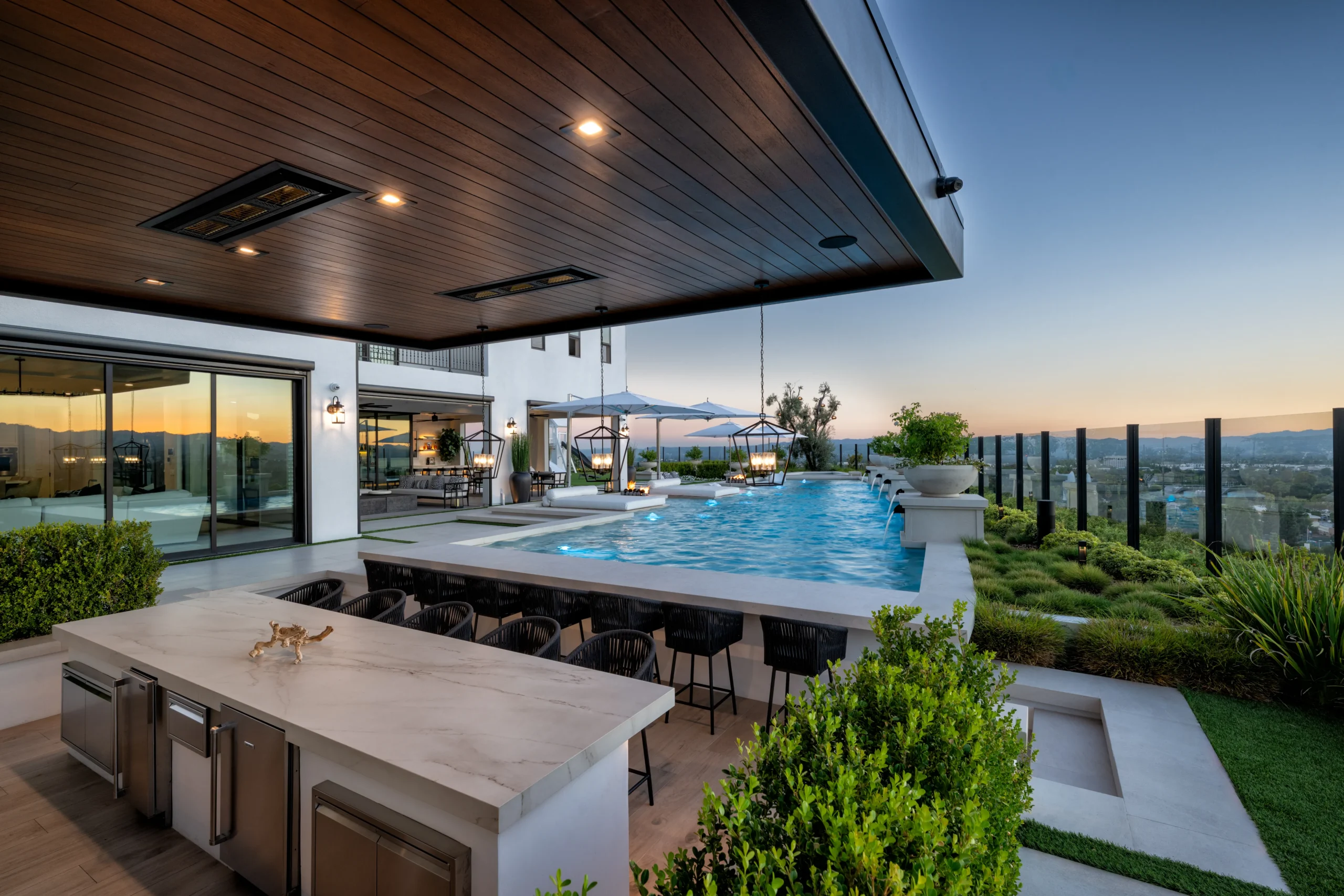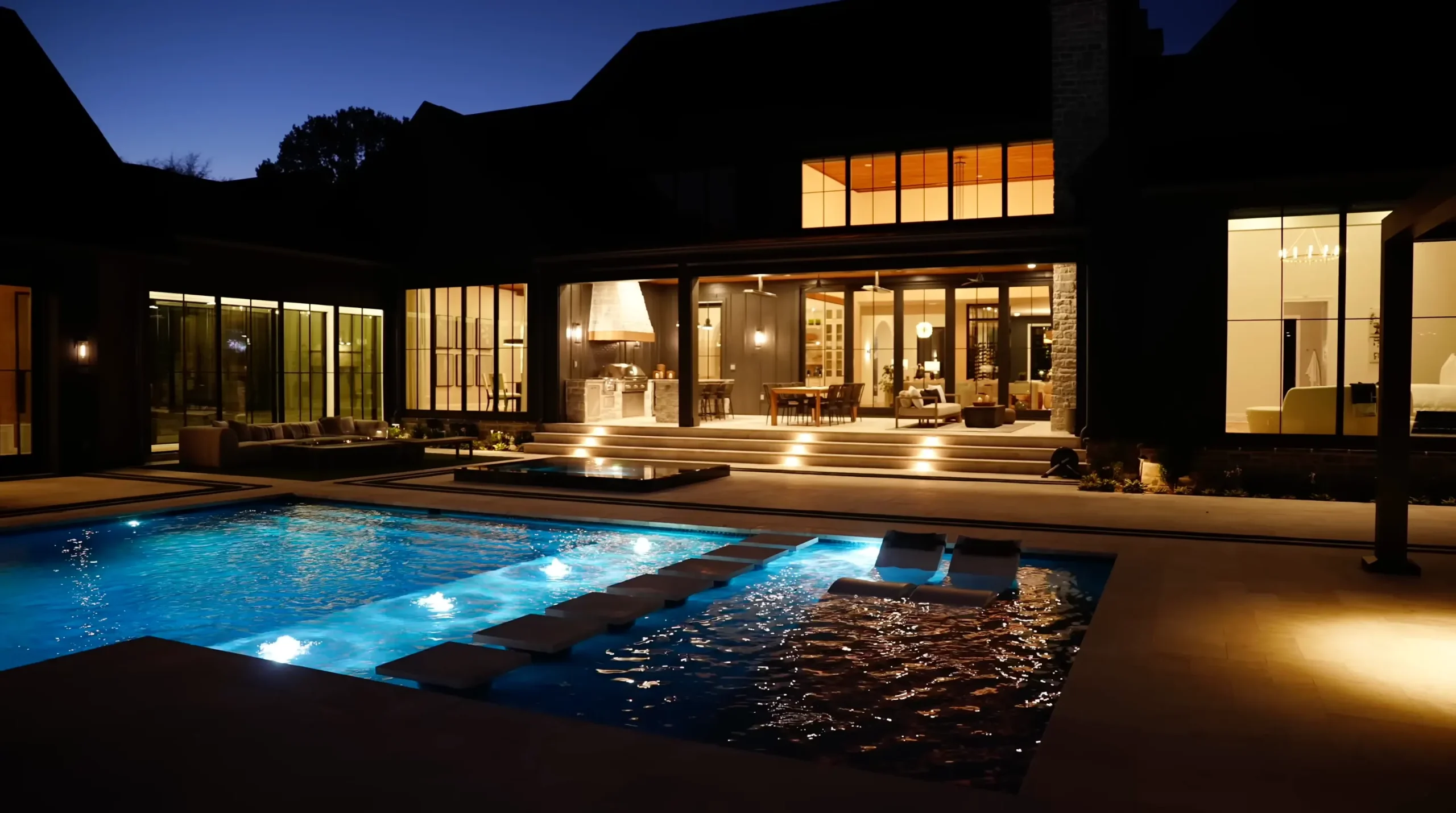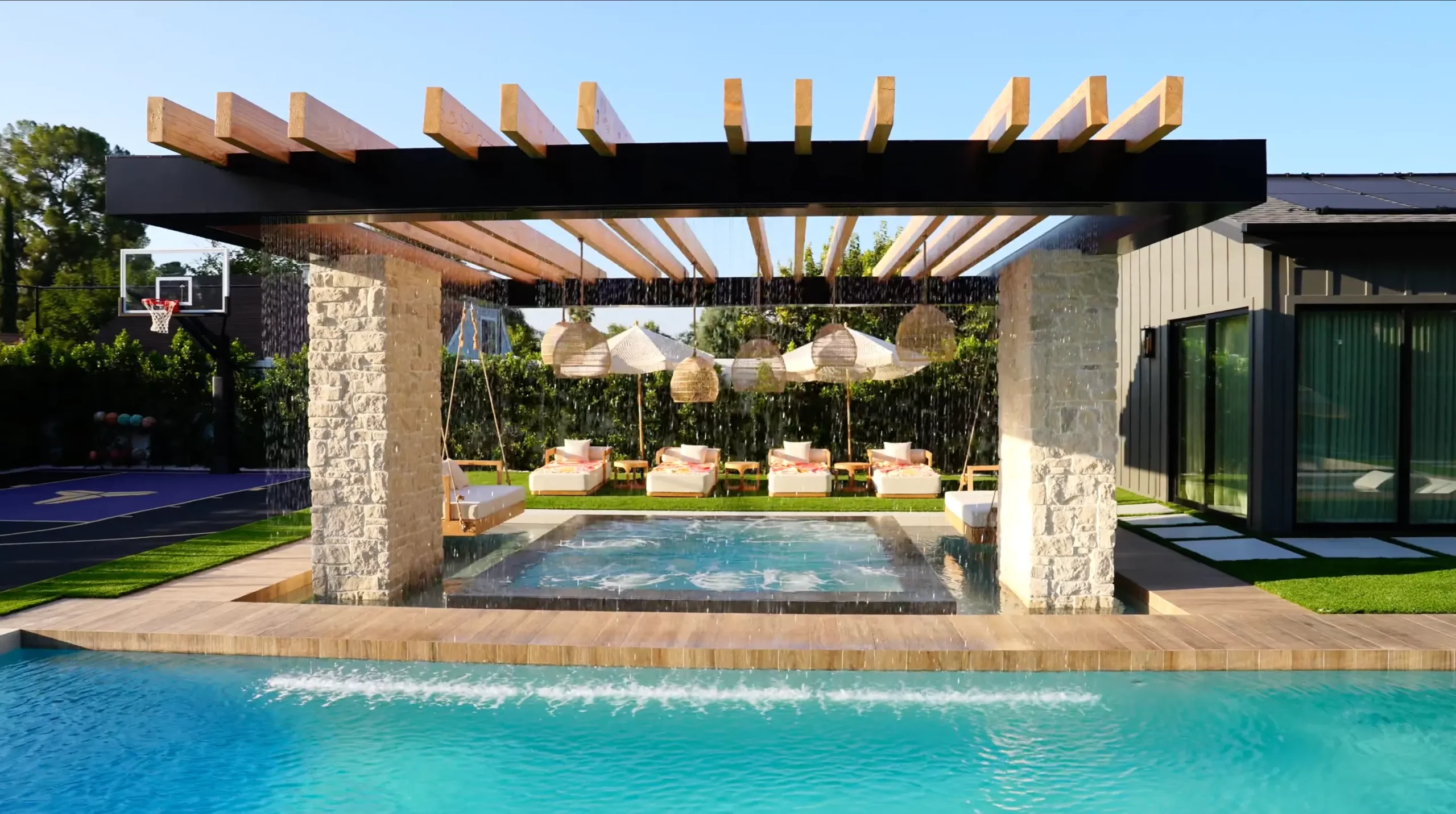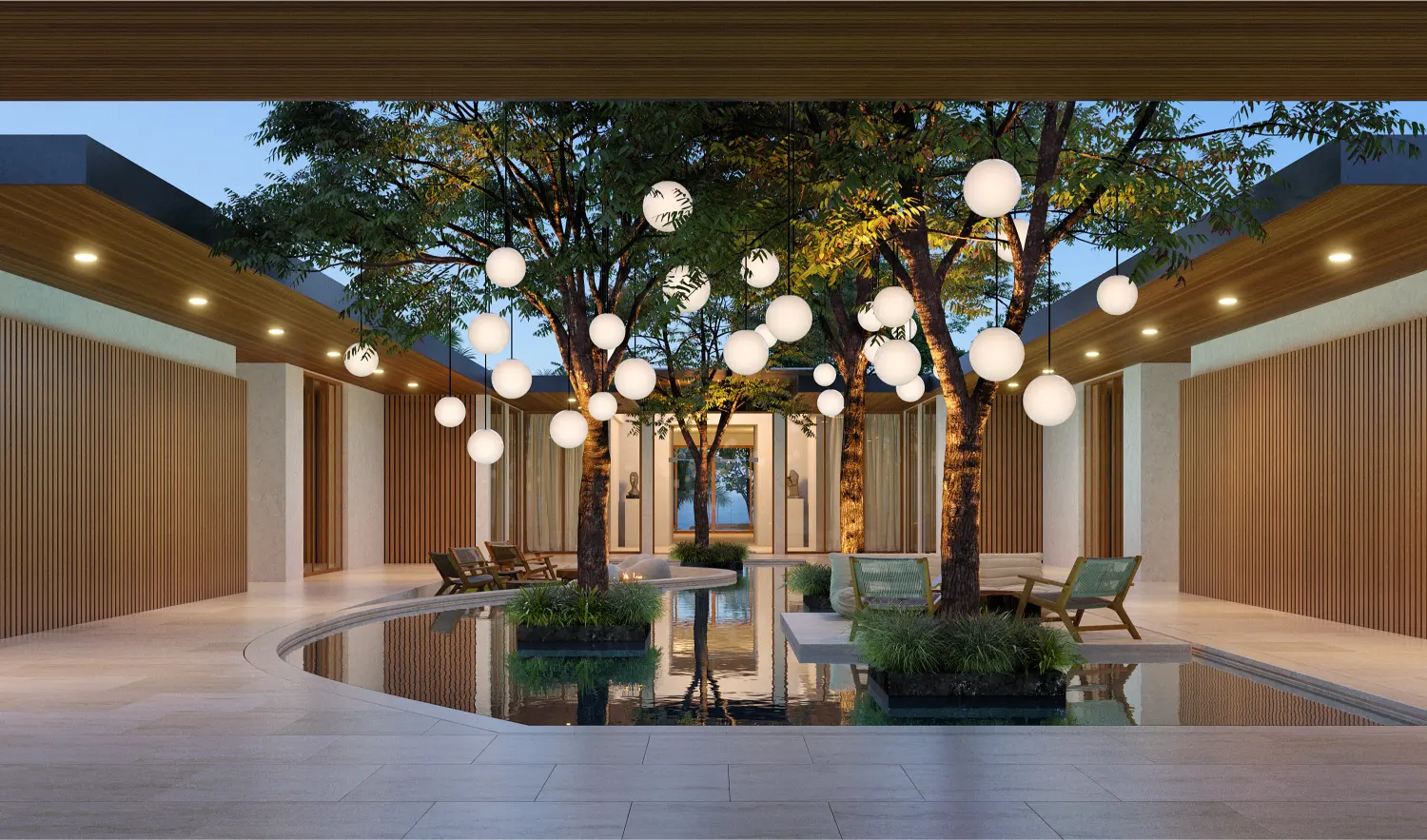Key Takeaways:
When you’re building an outdoor kitchen, we’re sharing do’s and don’ts so you end up with an outdoor dining and kitchen area you love.
– Start with the Essentials. A grill, a fridge, and a sink are the core of any outdoor kitchen design. Lock these in first, then add accessories with intention.
– Design for Real Life. Counter space matters more than bells and whistles. Plan enough linear feet so cooking, plating, and gathering actually feel effortless.
– Don’t Overload. Outdoor storage gets dusty by nature, so only keep what you’ll use often in your outdoor space. And this means less need for more cabinetry.
– Express Your Personality. An outdoor dining space is the perfect zone for a bold material or detail, because the footprint is contained, but the impact is big.
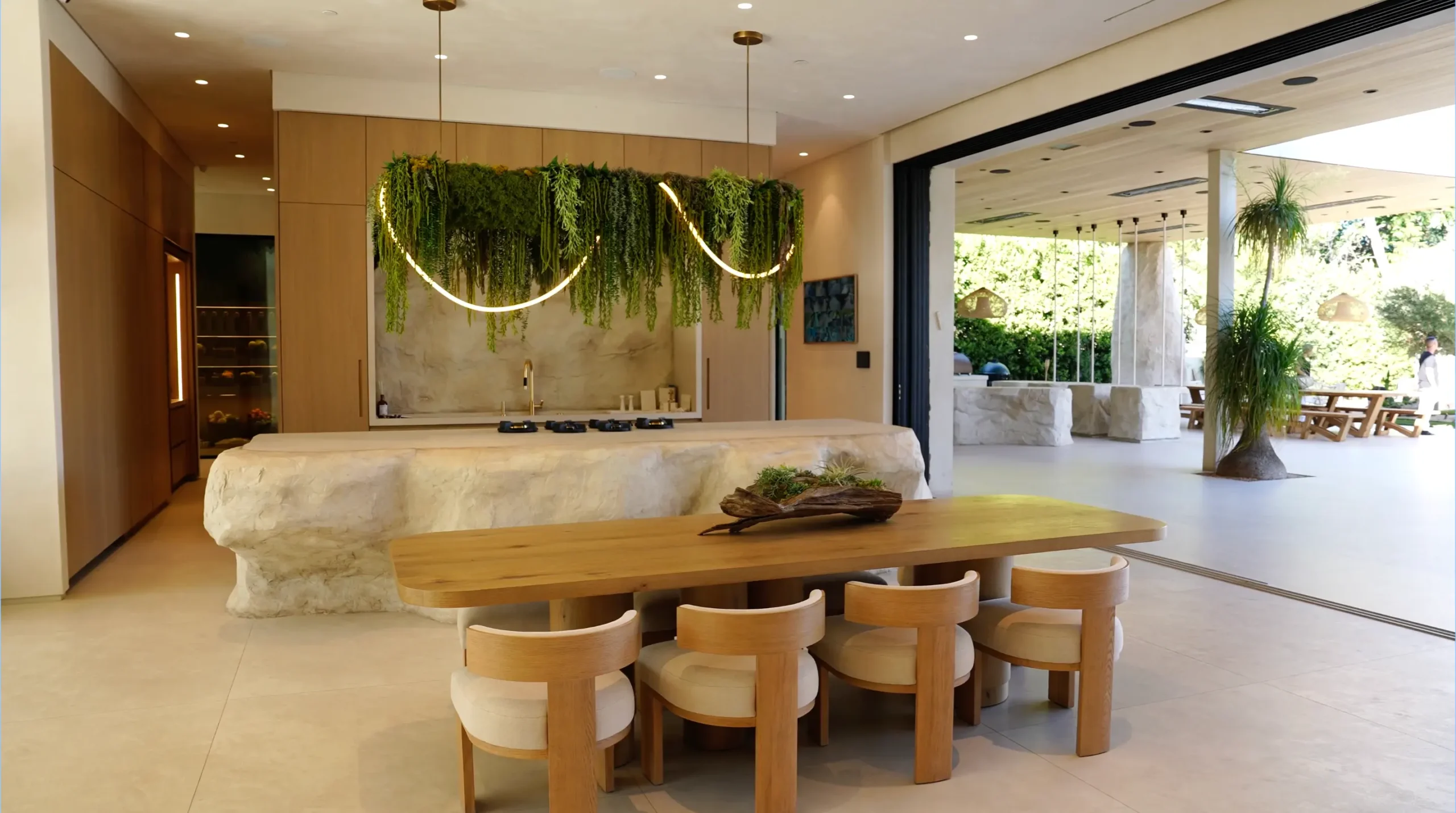
Your kitchen is the heart of your home. And, an outdoor kitchen can be the focal feature in your outdoor space, as well.
For many homeowners, the kitchen is a place where we put so much time, energy, and expense into making it their perfect space.
But what if you had an outdoor kitchen and dining area that you loved just as much as your interior kitchen?
I want to show you what’s possible in an outdoor dining and kitchen space. And share the do’s and don’ts of what you should keep in mind as you’re designing the perfect outdoor kitchen experience.
If you’re ready to work with our design team to bring your dream yard and outdoor kitchen to life, click the button below to book a free design consultation call to get started.
Outdoor Kitchen Essentials: Grill, Fridge, Sink
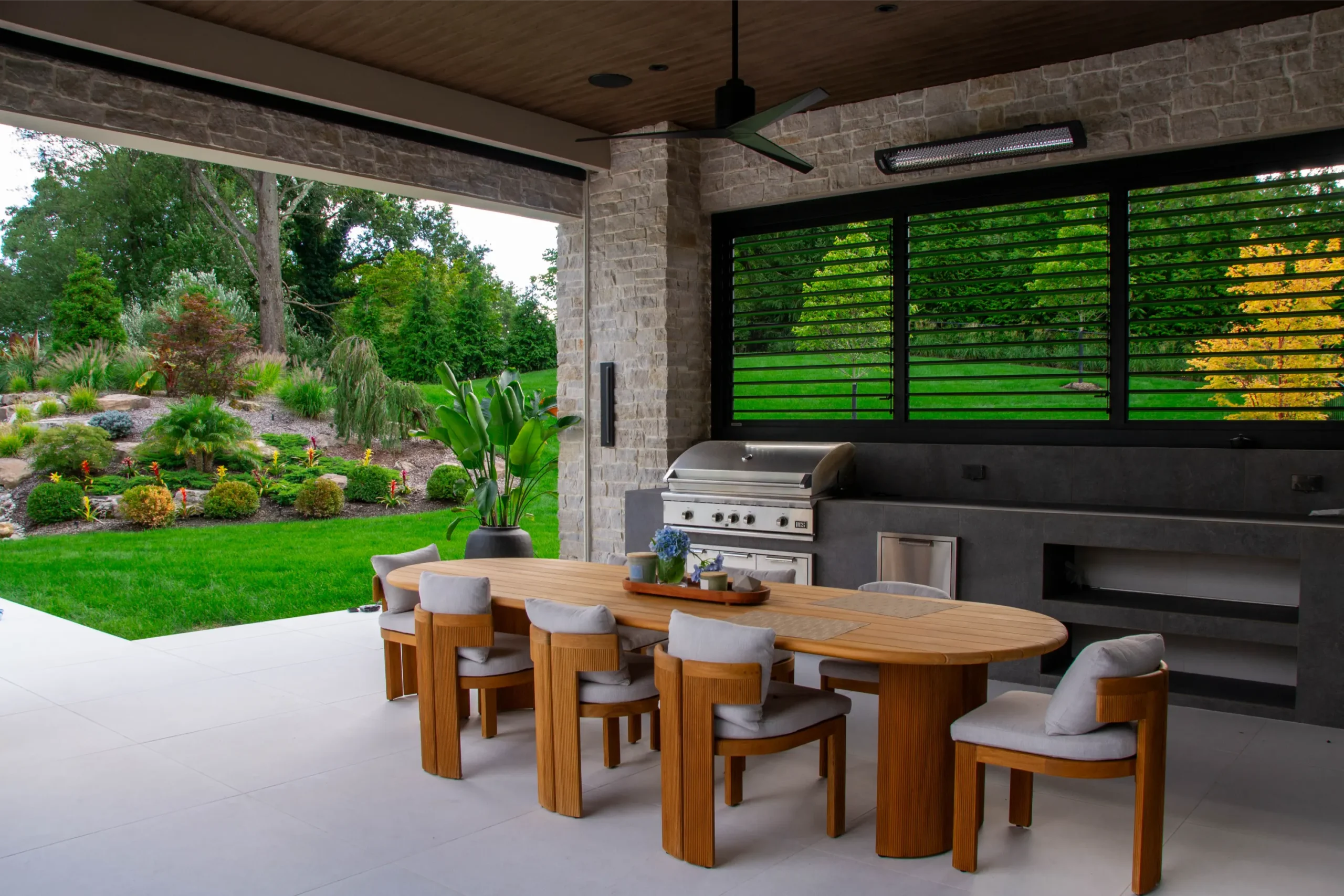
Whenever I am talking with a client and we’re designing their outdoor kitchen, the thing I always start with is listing all the elements that are must-have’s for them.
Typically this includes a grill at the very minimum. And after that, priorities usually include an outdoor fridge and a sink. These are the top three standard, bare-bones features that pretty much everyone includes in an outdoor space — even if they have a really small area to work with.
These are the fundamentals that you need for an outdoor kitchen or dining space, but they may look different for each client. For some people, having an outdoor fridge specifically for drinks is something they really want. Whereas, others might think a fridge is overkill for their needs.
And while a sink is a nice-to-have for any outdoor kitchen, some yards can’t accommodate the installation. A sink requires plumbing and not all yards are equipped for that.
Adding Outdoor Kitchen Accessories
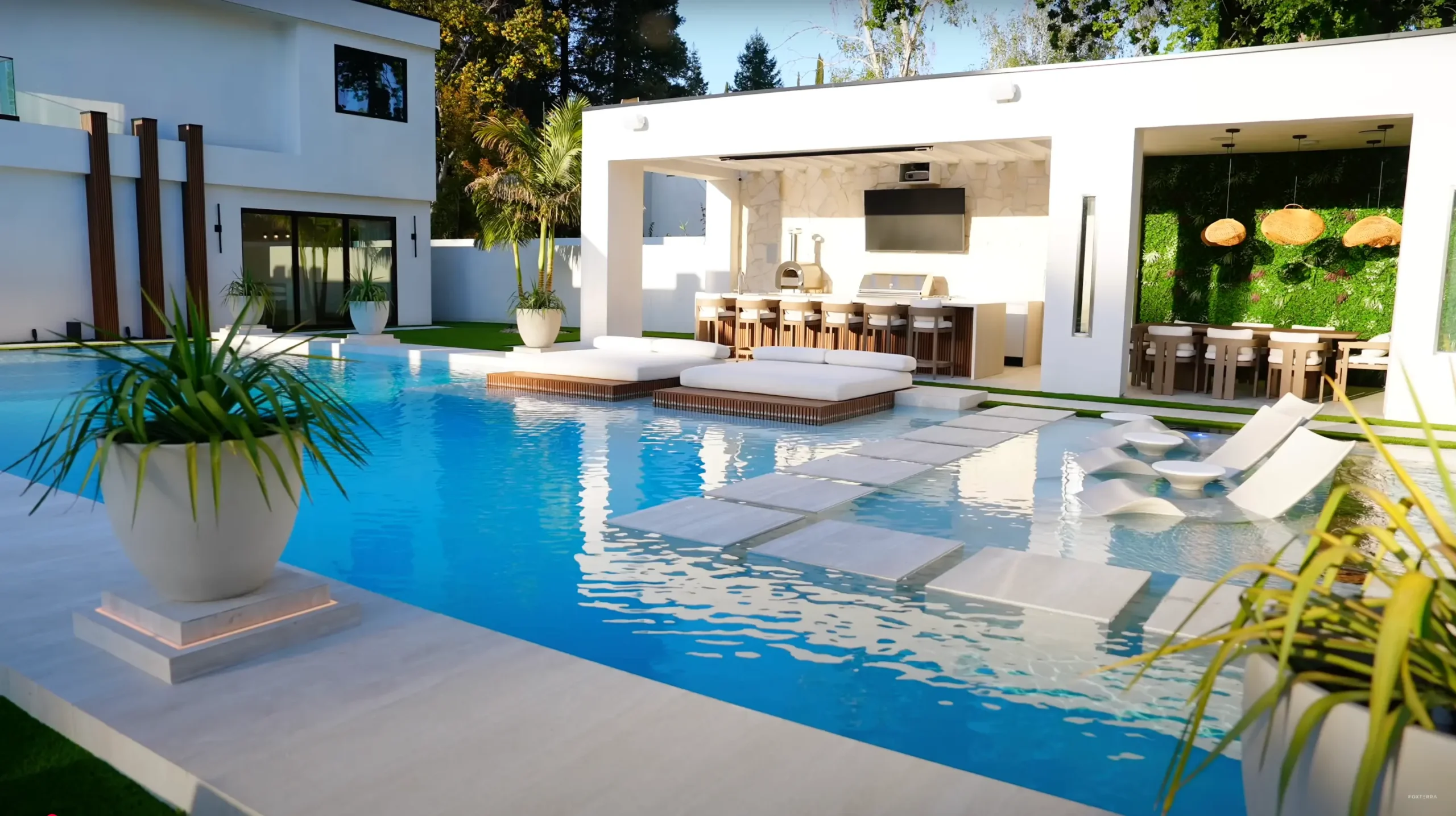
From there, we start talking about accessory features.
The first one we typically get to is an ice maker. An ice maker is so useful, especially in the summer months. It’s already so hot outside, you don’t want to have to continuously run inside to get more ice. It can really come in handy.
After that, I would recommend a built-in trashcan. This is something that is seamless and integrated into the kitchen space, so you don’t have a garbage eyesore, but you get that functionality of having a trash can in your outdoor space.
Something else that has really accelerated in popularity in the last few years are pizza ovens. These come in all shapes and sizes, and levels of luxury. But, it’s something we’re seeing more and more and is a feature our clients are requesting to have integrated into their outdoor kitchens.
A Unique Outdoor Kitchen Request
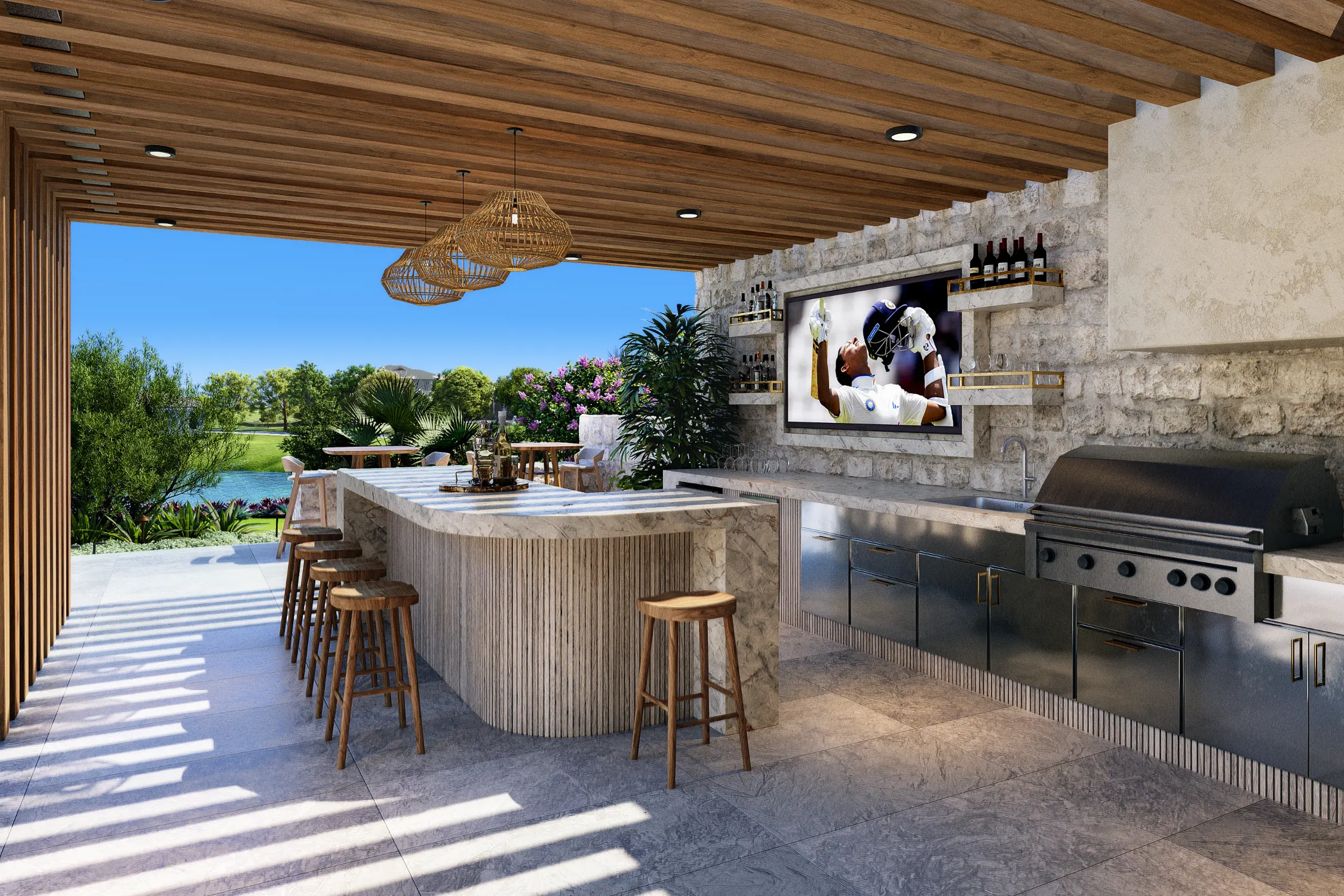
One of the most unusual features I have ever been asked to include in an outdoor kitchen is a towel warmer. This was for a client who lived in a northern climate — in Canada — with really cold, harsh winters. Having a towel warmer in your kitchen might seem like an unnecessary addition for some people, but for this client, it was something that helped them enjoy their outdoor dining space on some of those colder days and evenings.
The sky is the limit when it comes to designing your outdoor kitchen.
Designing Your Outdoor Kitchen Layout
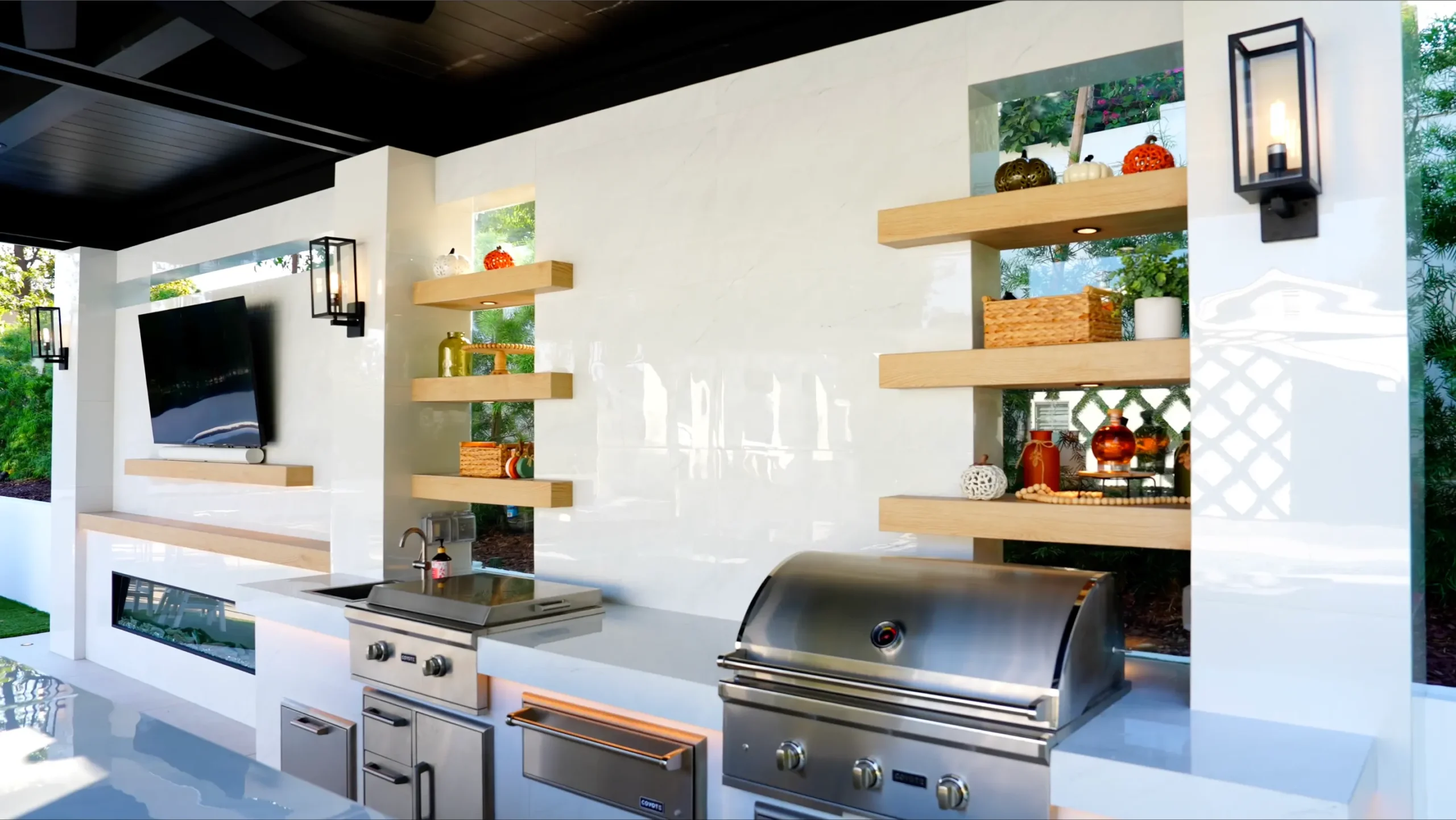
The second thing to remember when designing your outdoor kitchen and dining area is space limitations. Sometimes you’re so focused on your wishlist of items that you want to make sure you include in the kitchen, that you end up with zero counter space. Or a kitchen that just feels overcrowded. Or that isn’t actually very functional.
When you’re having a cookout, and you’re grilling, then you have nowhere to set a platter or to gather your ingredients, it makes it really difficult to actually use your kitchen space. So it’s really important to think about scale, function, and the space that you do have to work with when you are planning your outdoor kitchen and dining space.
Here is an example, using real-world numbers:
– The bare minimum is 8 ft. This will accommodate a grill, possibly a sink, and a little bit of counter space.
– To feel a bit more spacious, 10–12 ft. should be sufficient.
– And anything over 12 ft. is going to feel like plenty of room for your outdoor kitchen space.
Keep linear feet in mind when you’re designing your outdoor kitchen.
Don’t Over-Design (and the Truth About Outdoor Storage)
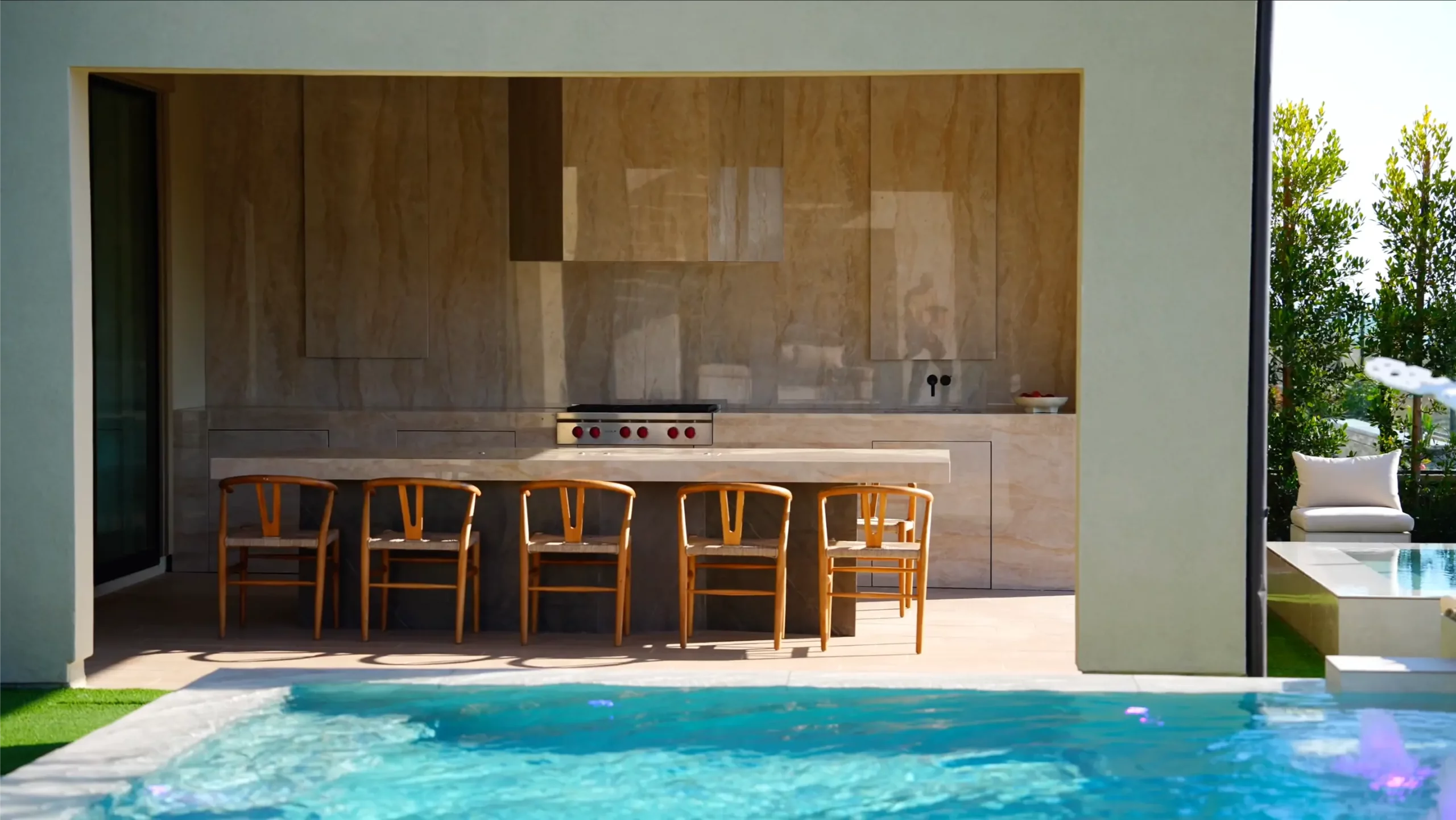
The next tip is to ensure that you do not over design your kitchen or dining space.
In the interior, we spend so much time, energy, and expense, trying to really get it perfect with all the bells and whistles. But when it comes to the exterior, it’s better to be selective about design elements.
This is especially true for outdoor storage. It’s not a good idea to have the mindset “my outdoor kitchen is “X” big, so I need “X” amount of outdoor storage. The biggest difference for indoor vs outdoor kitchen storage is that when you are storing anything outside, it will get dirty. Even if it’s completely covered, inside a cabinet with a door. That’s just the reality of being outdoors.
And that’s why we recommend you just keep the essentials in your outdoor kitchen. And maybe only put things in your outdoor cabinets that are easy to rinse off and get clean. You don’t want to store all the same elements that you have inside your kitchen, out in your exterior kitchen.
Keep your outdoor cabinets reserved for the bare essentials and that means you don’t need as much storage outside, as you would in an interior kitchen.
Make Bold Design Choices
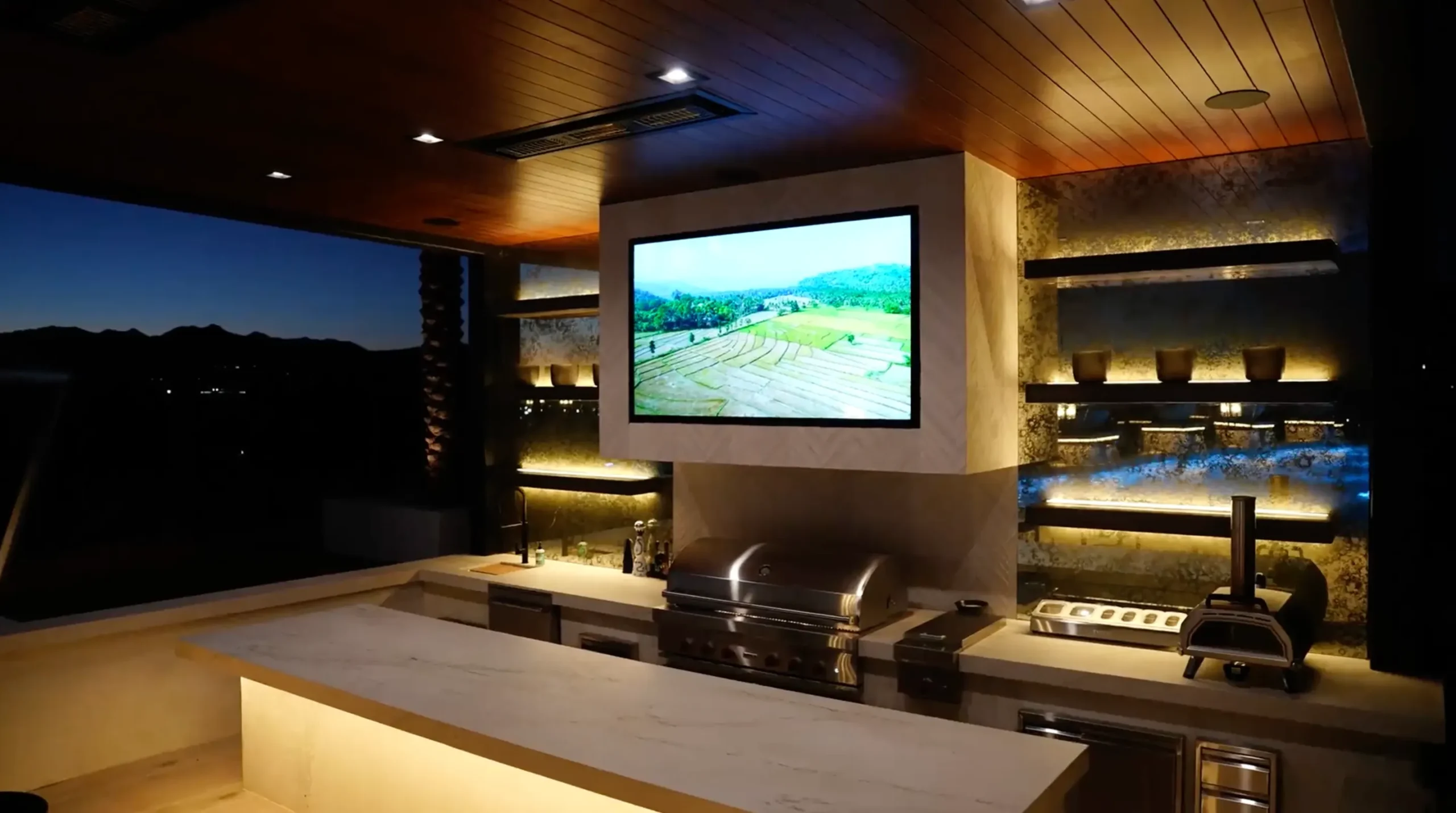
My final tip, and this is something that I believe very strongly. Is that your outdoor kitchen is the perfect place to showcase your unique personality.
What do kitchens and personalities have in common?
When we’re talking about a pool, or Jacuzzi, you’re not going to be choosing a statement material, or an out-of-the-box color because they are such large, important features. But when it comes to an outdoor kitchen, it’s a small, contained space. And this means that you can make some bold choices that would feel over-the-top in a larger area of your yard. But, in the context of your outdoor kitchen, they can really make it a unique, vibrant space.
For example, we just recently visited one of our finished yards, and the homeowner chose a smoked glass to frame the outdoor kitchen. This was a very unusual choice, but it really made the outdoor kitchen space feel even bigger than it actually was. And smoked glass is something you don’t see very often, so it felt really unique to have the two panels on either side of the kitchen.
You can make your outdoor kitchen look so custom and unique based on the design choices you make.
Transforming Your Yard

No matter what features you imagine for your outdoor kitchen, whether it’s a compact cooking station or a full dining space, our designers are here to help you bring it to life. Click the button below to book a free design consultation call with our team and start designing your ultimate outdoor kitchen.
If you’re not ready to reach out just yet, download our Exterior Design Style Guide. It will help you uncover your ideal outdoor aesthetic, learn how to describe it clearly, and gather inspiration for your future outdoor kitchen and dining space.
👉 Start Your Design Today
📩 Subscribe for Weekly Design Ideas
📌 Explore The Exterior Design Style Guide
How to Combine Two Design Styles Into One Luxury Yard (That Still Feels Cohesive)
How do you blend two completely different design styles into one cohesive outdoor space? In this video, the Foxterra Design team shows how to blend design styles, like Modern Organic and Tulum-inspired, without clashing.
Frequently Asked Questions
Q: What are the three must-have features for an outdoor kitchen?
A: A grill, an outdoor fridge, and—when feasible—a sink.
Q: How much space do I need for a functional outdoor kitchen?
A: Plan for at least 8 ft; 10–12 ft feels more comfortable; 12+ ft offers plenty of room.
Q: Which outdoor kitchen accessories are most useful?
A: An ice maker, a built-in trash can, and (for many homeowners) a pizza oven.
Q: Should I include lots of outdoor storage?
A: Keep it minimal. Outdoor storage gets dusty; store only what’s easy to rinse and use often.
Q: Can I add unique features like a towel warmer?
A: Yes—unusual features can make sense for climate or lifestyle. The key is designing with intention.
Q: How do I add personality without overwhelming the space?
A: Choose one bold material or finish (e.g., smoked glass) to create impact in a contained footprint.
Behind The Blog

Justin Fox
Founder & Creative Director
Founder Justin Fox grew up with a passion for landscaping. After 15+ years building luxury yards and pools as a licensed contractor, he saw the limits of the design/build model. Homes get detailed, architect-led plans, so why shouldn’t yards? In 2019 he convinced brother Nate Fox to join him and launched Foxterra Design to focus on immersive, luxury outdoor spaces.
Today, Foxterra creates resort-style residential environments for clients worldwide, pairing rigorous planning with bold imagination. Their work has been featured on CBS Sunday Morning, in Architectural Digest, and other leading design outlets.

Nate Fox
Designer
Nate Fox helps shape Foxterra’s creative vision, blending architectural detail with a designer’s eye for proportion and flow. His work redefines the backyard as an extension of modern luxury living.
For this story, Nate explores how bold design choices in an outdoor kitchen can elevate the space and make it look custom. Plus, outdoor kitchen essentials, what to. avoid for your exterior dining and prep space, examples from some completed Foxterra yards around the country (and in Canada), and more.


